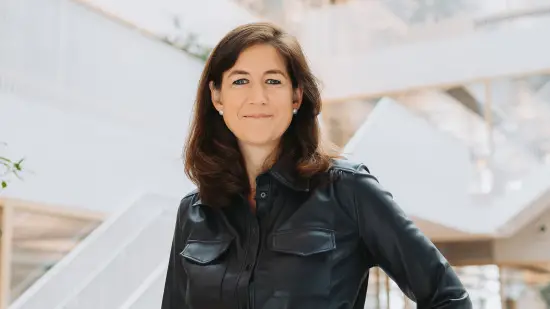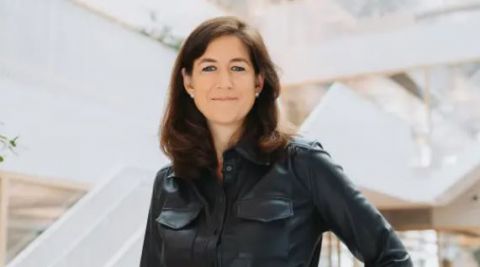- English
- DEUTSCH
- SPANISH
- FRENCH




As a leader and pioneer in her field, her research group centres on ethical and social issues in modern technology such as artificial intelligence, tissue engineering and stem cell research.
We sat down with Annelien to discuss her role as Rector Magnificus, the latest research in her field, the value of interdisciplinary education to solve societal issues and what advice she would give to women in STEM.

As Rector Magnificus, I sit on the executive board at the Erasmus University Rotterdam, home to 33,000 students and 4,000 employees. I’m responsible for educational curriculums, research and impact programmes, the library, and science education, as well as the social sciences, economics, business, law and medical schools and their scientific staff.
In my daily work, I collaborate with Deans, academic directors and many other staff members. It is a challenging job and there is always so much happening, but I love the diversity of the work.
A quote that has always stuck with me is “you cannot be what you cannot see”. Being the first female in this role can help people to consciously and unconsciously recognise that women should be in these positions. The percentage of female professors in the Netherlands is still relatively low, around 25% at my university, so in response we have developed an active policy on promoting and recruiting female associates and full professors.
But I’m not concerned about building an all-female team, rather more diverse teams – whether that’s gender, cultural or neuro diversity. It’s no secret that diverse teams make better organisations. It’s also important to address what diverse female leadership can look like. For example, I have a young son who I need to take to kindergarten. Within my position, I want to show people you can take time to do these things and still be dedicated to your job.


There is a stereotype that to be a famous professor, you must be published in influential journals or invent something unique. My ambition is to break the stereotype that there is only one way to become a professor or for any other career.
I aim to guide Erasmus University Rotterdam into becoming an impact-driven university, where every student has the skills to become transition leaders. This means instead of looking at more traditional career opportunities, our students are given the tools to tackle the economic, societal and environmental issues facing the world.
As a professor of biomedical ethics, I’ve seen first-hand that innovative technologies are ready to be implemented, but people and cultures are not ready to embrace them. The early developers of biomedical technologies or artificial intelligence, for example, are rarely conscious of its societal impacts.
But if you collaborate with people from the humanities and social science, it will not only encourage responsible innovation but also increase the chance that this idea will actually integrate into society.
Another research area that fascinates me is the digital revolution. The pandemic has given us a chance to reflect on where we can improve our digital and hybrid offering. Teachers can provide short video clips for students to watch at home, for example, rather than just sitting in lectures.
The time in class can be used for dialogue and impact learning through flipped classroom concepts. In this way, technology can be a huge force for good in education.
Throughout my career, I have found scientific research really exciting. I’ve never been a specialist, however, and my passion to reform the university system away from a focus on specialism has shaped my current work as Rector Magnificus. At the same time, I’ve always been politically active. For the last seven years I’ve been a member of the Dutch senate, serving as floor leader representing what is now the second biggest party in government.
My political work has shown me that there is so much to learn outside of what usually gets taught at university, for example the power of management and negotiation. I have been serving on the advisory board of the Amsterdam Medical Centre and the Metropole Orchestra. I might not seem a conventional fit for these positions but knowing how decisions are made and how to connect different worlds together continues to shape my work today.
Over the next few years, I see my role as ushering a transition that will futureproof the university. What is unique about universities is that they produce the knowledge, tools and insights to tackle big societal problems. This means we need to build our interdisciplinary curriculum so students develop skills not only useful in their university courses, but also in challenges outside the classroom. For example, we have developed a third-year bachelor programme, an impact learning course, where the students go out to real-world organisations. They will build the skills and insights to become the next generation of leaders solving the next big business and societal challenges.
The best advice I can give is don’t be afraid to go off the beaten track. I come from a medical family but instead of going down that route, I developed a line of research in a pioneering field of ethics in technology. Throughout my career, I’ve made a real effort to work in places with potential and growth opportunities. Getting out of your comfort zone might seem inconvenient, but there are so many opportunities for you once you get there.
Perrett Laver specialises in executive search to identify outstanding leaders globally. We connect influential organisations with dynamic leaders who share common values and visions for the future.
Our deep understanding of each client’s values and culture ensures we find candidates from diverse sources who bring fresh perspectives and real impact.
We connect influential organisations with dynamic leaders who share common values and visions for the future.Our deep understanding of each client’s values and culture ensures we find candidates from diverse sources who bring fresh perspectives and real impact.